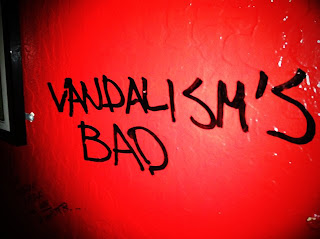Why are no Kindles allowed at the Hay Festival? Apparently it "goes against the ethos of a town to have a machine you can read a story on (From the transcription of the video No Kindles Allowed, see below)."
Edit (June 2, 2012): See the bottom of this article for an update to the situation.
I had never heard of the
Hay Festival before, which I feel a bit silly about now since apparently it's quite famous.
The Hay Festival of Literature & Arts is an annual literature festival held in Hay-on-Wye, Powys, Wales for ten days from May to June.... [T]he festival was described by Bill Clinton in 2001 as "The Woodstock of the mind".
- Hay Festival
Ian McEwan once gave a great line about why he previews his novels here [at the Hay Festival]. He joked - 'I don't do research anymore, I ask the audience at Hay'.
- Hay Festivals
Today is June 1, so the Hay Festival should be in full swing.
Passive Guy came across a video that looks as though it was shot at Hay-on-Wye, where the festival is taking place. As of this writing, the video can be found in the
hayontv YouTube channel.
I've embedded the video and included a transcription, below.
My transcription:
(Woman sitting in a bookstore looking at the camera.)
When you drive into a small American town you often see, by towns side, apart from the number of people that live there, is that it's a nuclear free zone, or something like that, because the local councils have voted on that.
We would like Hay to be a Kindle free zone.
We really feel it goes against the ethos of a town to have a machine you can read a story on. The book is the thing in this town. And we would like to really ban them [Kindles] and treat people coming with Kindles quite harshly.
(Woman walks through bookstore and addresses a man. The woman is now off camera.)
Woman: I heard you actually told somebody off the other day for sitting outside the next door shop reading from a Kindle.
Man: Well, I was gasped in surprise and I did restrain myself from grabbing it and jumping up and down on it and then slashing it to bis with my lightsaber.
(Laughter from off camera.)
Man: So in fact the person holding it was quite lucky they escaped with their Kindle in one piece.
Woman: So no Kindles allowed at this years festival?
Man: No Kindles. Anybody seen with a Kindle will be unceremoniously dumped on the wayside.
I'd like to stress that this story is unconfirmed. It certainly could be someone's idea of joke. I have contacted the Hay Festival in an effort to confirm the story, but I haven't heard back from them.
I should mention that when I looked through the
hayontv YouTube channel I found
this video of a hiker openly using her Kindle. She was interviewed but appears to have come through the experience no worse for wear.
If I hear anything else about Kindles not being allowed at the Hay Festival, I'll be sure to update this post.
June 2nd Update
I just heard back from the folks at Hay Tourism. Here is the reply:
Thank you for your email.
Please ignore the foolishness on the video. Mr & Mrs Addyman have a couple of bookshops in Hay so I can see they would rather people purchased books rather than people having Kindles.
I agree in that nothing can replace a good book but for convenience, especially when on holiday when one has to consider baggage weight etc., a Kindle is ideal.
So please do not let such things prevent you from visiting us here in Hay - I am quite sure it was all done, as you say, tongue in cheek - and bring your Kindle!!
Kind Regards.
Pat
So it seems the video expressed the sentiments of two individuals rather than the town, or the Hay Festival Committee. I am glad. It looks like a terrific festival, one I would love to attend one year.
I can understand the desperation bookstore owners must feel in a town where six bookstores have closed in the past year (this is according to the second video I listed, see above).
Here are two articles about the situation at the Hay Festival:
-
The man who would be 'king' of Hay-on-Wye
-
Kill the Kindle! In home of the Hay Festival, bookshop boss goes to war on gadget that 'turns readers into robots'
Also, there is a lively discussion going on over at
the Passive Voice Blog.
"No Kindles Allowed At The Hay Festival," copyright© 2012 by Karen Woodward.







